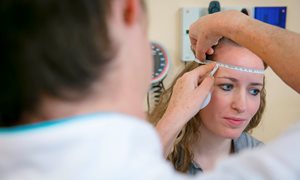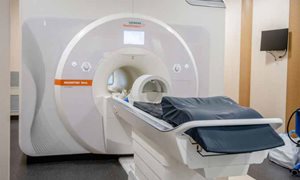
Patients with atypical cartilaginous tumors no longer require surgery. In most cases, these tumors remain stable, do not become malignant, and rarely cause symptoms. Monitoring by MRI scans is therefore sufficient, according to PhD research by Claudia Deckers of the Radboud university medical center.
Every year, about 150 Dutch people are told that they have an atypical cartilaginous tumor. These are non-malignant tumors in the bones of the arms and legs. They are almost always found by chance, for example when making a scan for an injury. The standard treatment is to surgically remove the tumor. However, this is not necessary, concludes Claudia Deckers of Radboud university medical center in her PhD thesis.
Tumors often stable
In approximately 130 patients, Deckers studied what happens if you do not operate on these tumors, but monitor them using MRI scans. Half of the tumors remained stable over a period of several years. More than one third decreased in size or even disappeared completely. And although thirteen percent showed slight growth, none of the tumors became malignant.
Deckers explains the results: 'We knew very little about how these tumors develop, because we always removed them. This research shows that we can spare patients such an operation. They rarely experience symptoms. By not operating, patients are not out of action for weeks, they are not at risk of complications, and we save a lot of costs.'
Regular scans
At Radboud university medical center, patients with atypical cartilaginous tumors are no longer operated on. Instead, they are monitored using regular MRI scans. These scans are performed after six months, a year and a half, three years, and five years. Deckers expects this to decrease: 'Because the tumor usually remains stable, a long follow-up period is often not necessary. And if we see that the tumor has decreased in size, we no longer scan at all. In the future, we may be able to predict how the tumor will behave based on the first scan. My research shows that determining the amount of entrapped fat in the tumor can aid this.'
International impact
The study results also have impact beyond the walls of Radboud university medical center, says Ingrid van der Geest, orthopedic surgeon and one of the research leaders. ‘Our approach is increasingly employed in other hospitals. We also share data about this condition with other centers and vice versa. This offers opportunities for additional research into atypical cartilaginous tumors, so we can further optimize the treatment.'
Similar results were recently found in other countries. An international meeting with experts in this field will be held in 2024, during which agreements will be made about the standard treatment of atypical cartilaginous tumors. Van der Geest: 'The World Health Organization still advises: “Operate”. That really needs to change.’
More information about this PhD thesis defense
PhD thesis defense of Claudia Deckers on May 17th at 12.30 p.m. Title of dissertation: Cartilaginous bone tumours – New perspectives on treatment of atypical cartilaginous tumours (available online after May 17th). (Co-)supervisors: prof. dr. H.W.B. Schreuder, dr. I.C.M. van der Geest, and dr. E.F. Dierselhuis. The defense can be followed via this livestream.

-
Want to know more about these subjects? Click on the buttons below for more news.







